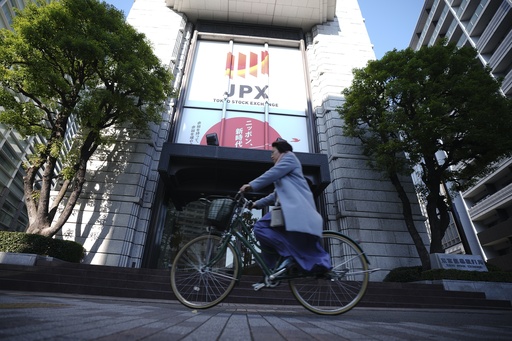
TOKYO – On Tuesday, Asian stock markets experienced a positive trend, buoyed by significant gains in technology shares that helped Wall Street reach fresh record highs.
The S&P 500 index rose by 0.2% on Monday, marking its 54th record of the year, while the Dow Jones Industrial Average decreased by 128 points, or 0.3%. In contrast, the Nasdaq composite surged by 1%.
Some market analysts believe that Japanese companies may benefit from the recent tariff threats announced by Donald Trump, specifically aimed at China and other developing nations. Trump’s warning involved imposing a staggering 100% tariff on these economies if they were deemed to be undermining the value of the U.S. dollar.
Japan’s Nikkei 225 index saw an impressive increase of 1.8% during morning trading, reaching 39,215.99. Notably, shares of Tokyo Electron jumped by 4.4%.
Meanwhile, Australia’s S&P/ASX 200 index gained 0.7%, settling at 8,504.00, and South Korea’s Kospi soared 1.7% to 2,495.80, buoyed by new inflation data that indicated some recovery while still maintaining low numbers that could favor interest rate cuts as early as 2025.
The Hang Seng index in Hong Kong increased by 0.2% to 19,595.53, while the Shanghai Composite rose by 0.2% to 3,370.74.
On Wall Street, Super Micro Computer, a company that has seen its stock navigate wild fluctuations due to AI demand, soared by 28.7%, becoming the top performer in the market after an investigation cleared the company of any misconduct allegations concerning its management.
The tech sector showed strength, with Microsoft gaining 1.8% and Meta Platforms rising by 3.2%, both substantially contributing to the S&P 500’s upward movement.
However, Intel faced challenges as it lost its early momentum and fell by 0.5%, following the retirement announcement of CEO Pat Gelsinger, who has left his position on the board. The company is currently in search of a successor, with the chair emphasizing its commitment to regaining investor trust. Just last week, Intel lost its place in the Dow Jones Industrial Average to Nvidia, which has gained substantial traction amidst the excitement surrounding AI technologies.
Stellantis faced a setback as its CEO Carlos Tavares announced his resignation after nearly four years at the helm. The automaker, which oversees brands such as Jeep and Citroën, saw its stock drop by 6.3% in Milan, dealing with ongoing challenges related to declining sales and inventory issues at dealerships.
Most S&P 500 stocks experienced declines, including California-based utility PG&E, which fell 5% after declaring plans to sell $2.4 billion in stock and preferred shares to bolster cash reserves.
Overall, the S&P 500 increased by 14.77 points, settling at 6,047.15, while the Dow dropped by 128.65 to 44,782.00. Conversely, the Nasdaq composite rose by 185.78, reaching 19,403.95.
In the bond market, Treasury yields steadied after initially climbing. The yield on the 10-year Treasury note peaked at over 4.23% before settling back to 4.19%, slightly above Friday’s closing level of 4.18%.
This week is expected to deliver key updates regarding the U.S. job market, including the October job openings report, weekly unemployment data, and the vital November employment report, all of which could influence the Federal Reserve’s future decisions, particularly after recent maneuvers to lower interest rates to support economic growth.
Economists are optimistic that Friday’s significant report may indicate a rebound in hiring by U.S. employers for November, following a sluggish October that was affected by hurricanes and labor strikes.
“Currently, we find ourselves in a favorable economic environment that supports earnings growth while remaining weak enough to potentially justify Fed rate cuts,” remarked Mark Hackett, the chief of investment research at Nationwide.
In the energy market, U.S. crude oil prices fell by 9 cents to $68.01 per barrel. Meanwhile, the international benchmark, Brent crude, decreased by 3 cents to $71.80 per barrel.
When it comes to currency trading, the U.S. dollar strengthened, rising to 149.91 Japanese yen from 149.51 yen, while the euro slightly declined to $1.0493 from $1.0502.
